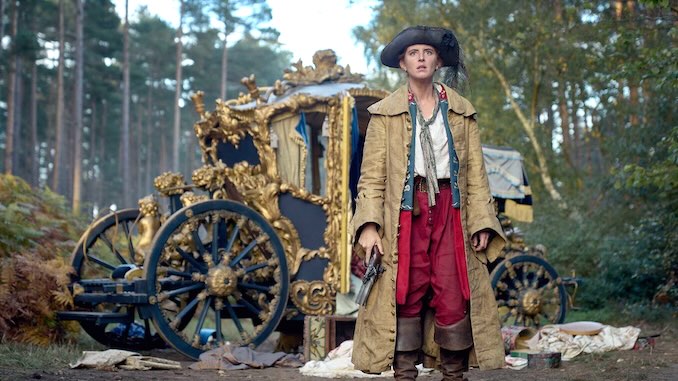The Beautifully Effortless Queerness of Disney+’s Renegade Nell
Photo Courtesy of Disney+

In Episode 6 of Disney+’s Renegade Nell, Polly Honeycombe (Ashna Rabher) quickly and (almost!) painlessly discovers that she is, in fact, gayer than originally planned. The episode features fantasy sequences and slow-motion shots that feel straight out of a romance novel, turning the titular Nell (Louisa Harland) into the white-shirted, rose-throwing heartthrob of both Polly and the audience’s dreams. It’s an extremely fun and playful way to make this series explicitly queer, but even before Nell and Polly shared that sudden and surprising lip-lock, queerness was already baked into the very DNA of Renegade Nell, making it a fantasy romp that feels like home in all the best ways.
From the very first episode, Renegade Nell goes a long way to establish an undeniably queer undercurrent that carries through the rest of the series, most specifically with its leading hero. Now, Nell is never “confirmed” queer, but even the mention of a deceased husband can’t completely dim the vibes that just radiate from this character. Frequently seen in trousers and refusing to conform to the standards for ladies of the time, she corrects anyone that calls her “Nelly” and staunchly refuses to be restricted by society’s expectations of ladylike manner and toff politeness. Even in her mystical powers, Nell embodies that of a queer existence. She is imbued with supernatural strength from her fairy companion Billy (Nick Mohammed), and to the rest of English society, she is a woman who carries the strength of 10 men and uses it to challenge the status quo.
Her supernatural ability to smash through societal expectations and standards mirrors the ways in which queerness, but most particularly lesbianism, challenges our patriarchal society, and acts as the ultimate enemy to toxic masculinity and a man-favored world. The toffs—namely the Earl of Poynton (Adrian Lester) and his cohort of would-be usurpers—see Nell as the ultimate threat: a woman who has both the power and the confidence to make tangible changes within England, all without the help of a (visible) man. Much like how Nell is an almost-immovable roadblock for the Jacobites, lesbianism acts as a similar roadblock to the construct of the patriarchy through the ways it de-centers men. Of course, Nell and her crew know that her deep kinship with Billy is actually what gives her this immense power, and that dynamic is what allows Nell to skirt the often-unavoidable accusations that characters like her represent the “man-hating” lesbian. While lesbiansim does reject the patriarchy, it certainly doesn’t benefit from some grand downfall of all men, and Nell’s deep and emotional friendship with Billy allows for this lesbian-coded character to form a unique bond with the same sex that her very existence seems to threaten.